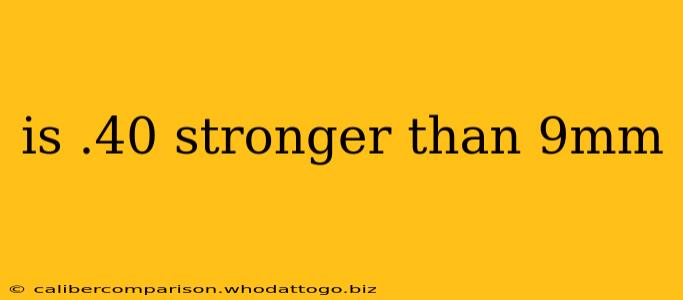Is .40 S&W Stronger Than 9mm? A Comparative Analysis of Handgun Calibers
The question of whether a .40 S&W is "stronger" than a 9mm is complex and depends on how you define "strength." While both are popular handgun calibers, they differ significantly in their characteristics, leading to varying performance in different contexts. Let's delve into a detailed comparison.
Comparing Key Ballistics:
-
Caliber: The .40 S&W (Smith & Wesson) has a larger diameter bullet (.40 inch) than the 9mm Parabellum (.355 inch). This larger diameter generally translates to a larger wound cavity.
-
Bullet Weight: Both calibers offer a range of bullet weights, but .40 S&W typically utilizes heavier projectiles. Heavier bullets generally carry more momentum.
-
Muzzle Energy: .40 S&W rounds generally possess higher muzzle energy than 9mm rounds. Muzzle energy is a measure of the kinetic energy the bullet possesses upon leaving the barrel and is a factor in stopping power.
-
Velocity: While .40 S&W often boasts higher muzzle energy, 9mm rounds frequently exhibit higher velocities. Higher velocity can lead to flatter trajectories and better accuracy at longer ranges.
-
Recoil: Due to the heavier bullet and higher energy, the .40 S&W typically produces more felt recoil than the 9mm. This can impact shooter control and accuracy, especially for less experienced shooters.
Stopping Power: The Myth of Superiority
The commonly held belief that the .40 S&W has superior stopping power is a complex issue. While the higher muzzle energy and larger diameter suggest greater potential for incapacitation, the reality is more nuanced. Stopping power depends on several factors, including bullet placement, bullet expansion, and the target's physiology. Numerous studies have shown minimal practical difference in stopping power between the two calibers when shot placement is considered.
Many law enforcement agencies have switched back from .40 S&W to 9mm because of the 9mm's improved accuracy and reduced recoil, ultimately leading to more effective hits and increased officer safety.
Practical Considerations for Choosing a Caliber:
-
Shooter Proficiency: The reduced recoil of the 9mm often allows for faster follow-up shots and improved accuracy for many shooters. The increased recoil of the .40 S&W can be challenging for some, particularly smaller-framed individuals.
-
Intended Use: The choice of caliber often depends on the intended use. For self-defense, both are effective choices. For law enforcement, the trend has shifted toward the 9mm due to its advantages in capacity and control.
-
Ammunition Availability and Cost: Both calibers are readily available, but 9mm ammunition is generally more affordable.
-
Concealed Carry: The slightly smaller size and lighter weight of many 9mm handguns make them a popular choice for concealed carry.
Conclusion: No Single "Stronger" Caliber
There's no definitive answer to whether the .40 S&W is "stronger" than the 9mm. The .40 S&W generally delivers higher muzzle energy and a larger wound channel, but the 9mm offers advantages in velocity, recoil, and ammunition cost. Ultimately, the best choice depends on the individual shooter's needs, preferences, and training. Focusing on proper training and marksmanship is far more crucial than choosing between these two capable calibers.

